


Morgan Sonsthagen
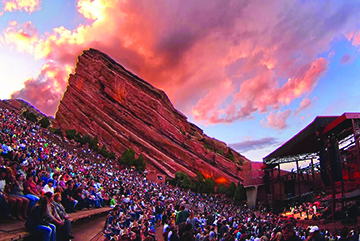
Can City’s Creative Industries Make A Comeback This Summer?
Glimmer Of Hope As My Fair Lady Is Set For August Opening; Renovated Clocktower Cabaret, Cleo Parker Dance Already Open
by Glen Richardson

Red Rocks Recovery: Opening of the 4,000-person Red Rocks Amphitheatre when the weather warms up would be a sure sign Denver’s urban heart is pumping again. AEG Presents has yet to signal it is booking summer concerts.
From restaurants to retail the Cherry Creek Valley is slowly reopening for business. But Denver’s urban heart — live concerts, theatre, comedy and the creative arts — remain mostly shut down creating an economic calamity that has drained the cultural lifeblood of the city.
Up until now the city’s pace-setting institutions — the Denver Center for Performing Arts (DCPA), Red Rocks Amphitheatre and the Colorado Convention Center — have been dark since the pandemic hit. So have a half dozen other theaters plus key dance, music and performance spaces. Reopening has proved far more daunting than anyone could have imagined.
Statewide mass Covid-19 vaccinations efforts plus restrictions lowered to Level Yellow in 33 counties, including Denver, have reignited hope and anticipation that venues and productions will begin reopening this summer. The opening light switch, in fact, has already been flipped at several spots and entertainment insider chatter suggests that opening could be imminent at additional venues by summer-fall.
Glimmer Of Hope

Against All Odds: The Denver Center for Performing Arts is tentatively planning to present Broadway’s touring version of My Fair Lady in the Buell Theatre Aug. 11-22. All of DCPA’s venues have been closed since the pandemic hit.
With summer solstice just 112 days subsequently to March 1, there are signs that the cloud of Covid-19 is starting to lift and the city’s cultural scene will reignite.
The Denver Center for the Performing Arts has announced that Saturday Night Alive will return June 12. The 40-year-old fundraiser has been reconceived in order to follow public gathering restrictions. “Currently, we hope to welcome both a virtual audience as well as on-site guests,” explains DCPA President-CEO Janice Sinden. “We envision an evening that can accommodate a smaller, in-person gathering and leverage the HD broadcast capabilities of the Seawell Ballroom.”
Furthermore, DCPA is tentatively planning to present Broadway’s touring version of My Fair Lady in the Buell Theatre Aug. 11-22. From the Lincoln Center Theater, the New York Times says revival of the musical “reminds you how indispensable great theatre can be.”
Small Venue Test
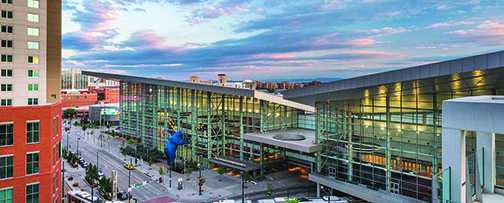
Convention Comeback: Meetings, tradeshows at the Colorado Convention Center aren’t likely in large number until the second half of the year. Booked through 2023, the city seeks to hang onto the business.
On its 15th anniversary The Clocktower Cabaret under the historic D&F Clocktower on the 16th Street Mall launched live shows beginning Valentine’s Day. Additional shows are expected this month in the nonprofit company’s 240-seat theater following months of renovation.
Cleo Parker Robinson Dance has also reopened her 240-seat theater in the former church site at 119 Park Ave. West. Official opening followed frenzied work to renovate the 24,000-sq.-ft. complex. Up to 20 area performing arts companies that have survived the pandemic are lined up to rent the space. Included are spin-off dance companies Moraporvida Dance, Nu-World Contemporary Dance Theatre and Feel The Movement.
Larimer Lounge is testing the waters with a Denver-via-Ecuador pop artist Neoma concert on July 10 followed by rock combo Matt Rouch & The Noise Upstairs the next day. Then on July 24 indie folk duo Shovelin Stone is scheduled to perform. The Larimer Lounge’s sister club, Globe Hall, is serving a barbecue dinner and a show and if all goes well, that venue will begin hosting shows of its own. While the Larimer Lounge experiments with dinner service, restaurants are reversing the test by trying out concerts to build business during the pandemic. Lost City Café in River North, for instance, plans to kick off a summer-long benefit series on its patio.
Ratings, Tech & Cash
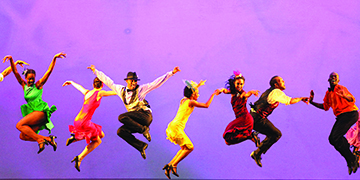
Dancing Into Renovated Digs: Cleo Parker Robinson Dance has also reopened its 240-seat theater on Park Ave. West. Up to 20 area performing art companies that have survived the pandemic are lined up to use the space.
Official ratings, technology and money are also key factors playing into the comeback of concerts and events. If, for example, the state moved the pandemic dial to Blue, DCPA would be able to entertain 175 guests in the newly-renovated Wolf Theatre. Moreover, fundraisers and weddings could host up to 175 guests in the Seawell Ballroom.
The pandemic has triggered technology while also altering event formats. After going digital last year, City Park Jazz is bringing back the free live concert, but with a mix of both virtual and live programming.
With a $2 million anonymous gift, the Colorado Symphony is now able to pay its employees through this summer. Moreover, Conductor Christopher Dragon’s contract was renewed through the 2022-24 season. Likely, it will also mean Boettcher Concert Hall will have additional live concerts plus the return of Symphony concerts to Red Rocks.
Sway Of Promoters
Recapturing Denver’s pre-pandemic momentum will require the booking of touring entertainers, shows and events by Denver’s two major event promoters AEG Presents and Live Nation. Founded by Philip Anschutz, AEG is the exclusive ticket seller for all Denver venues including Red Rocks. Summer shows here remain iffy despite the warmup including those booked by AEG at the Bluebird, Ogden and Gothic Theatres.
The odds aren’t much better at the Marquis Theatre or Summit and Fillmore Auditoriums that Live Nation books. Variety, however, did report Live Nation was “confident live music would return this summer.”
Financially it normally doesn’t make sense for national touring musicals or shows to visit Denver if they can’t also perform elsewhere around the country. Bottom Line: Shows and entertainers coming to Denver earlier than this fall (2021) will likely be one-offs, series from a single artist at a single venue, or regional tours playing unconventional venues.
Bedeviled Path Back
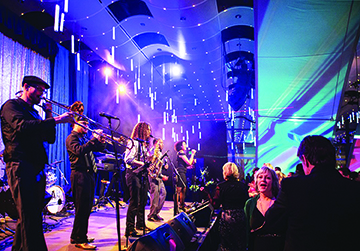
Fundraiser First: The showcase of live theatre has announced that the 40-year-old fundraiser Saturday Night Alive is returning June 12. Event will feature both on-site guests and a virtual audience.
The trajectory of infections, vaccinations and “overall behavior” will determine the number and size of this year’s summer-fall openings. The fear, of course, is that it only takes one super-spreader event to ruin it for everyone. Just as Denver seemed like it was finally in a place where people could plant a flag on the ground and claim a fresh start, trouble erupted.
After reopening three weeks earlier, the 40,000-sq.-ft. Grizzly Rose — known for hosting country music and featuring a 2,500-sq.-ft. dance floor — was caught by TV and social media cameras packed with hundreds of people inside the dance hall without masks when only 50 people were permissible.
Owner Scott Durland quickly closed the venue just north of Denver off I-25 voluntarily. Just two days later, however, Tri-County Health ordered the site shut down until further notice. The club had been cited for the same violations last fall.
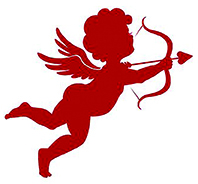
Can Cupid Conquer The Coronavirus?
By Glen Richardson
If love conquers all, can it overcome the coronavirus as Valentine’s Day 2021 approaches? The pandemic hit last year just weeks following Valentine’s day, making this year’s celebrating somewhat of a dilemma. Hopeless romantics, love is what people breathe here, so they are approaching the day with cautious optimism hoping tender hearts won’t be broken.
Notwithstanding vaccination availability plus reopening of dine-in service and easing of other restrictions, there is still uncertainty that the end is in sight. The number and variety of choices have noticeably narrowed.
As February 14 looms, Denver is ranked the nation’s 14th best city to celebrate Valentine’s Day. The Chronicle, acting as Cupid-in-Chief, identifies how to live life and celebrate love in this uncertain year:
Candy Man Can

Sweet Attraction: Candy from top shops will please your sweetheart’s palette. Stargazer Fine Chocolates’ chocolatier creates truffles, chocolate bars, nut & fruit filled bark to love.
Enstrom Candies, 201 University Blvd., 303-322-1005. For four generations the Enstrom family of Grand Junction has crafted their Almond Toffee by hand. The perfect gift of taste to delight your connoisseur lover.
Hammond’s Candy Factory, 5735 Washington St., 888-226-3999. A Denver fine candy manufacturer for nearly 100 years. Known for their art candy, candy canes, chocolate bars, hard candy, lollipops and kosher candy.
Lolli & Pops on lower level of the Cherry Creek Shopping Center, 303-390-5701. Store with large selection of gourmet candy, chocolate treats, and gifts. Choose from Belgian chocolate, caramels, truffles, and more.
Stargazer Fine Chocolates in the Colorado Plaza, 700 Colorado Blvd., 303-394-4000. Chocolatier at family-owned shop creates sweets to delight your eyes, please your palette. Choose from truffles, chocolate bars, nut and f
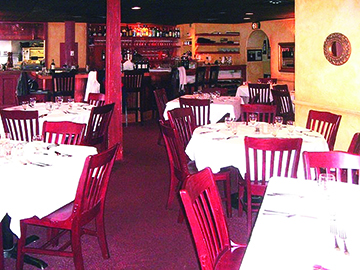
Recipe For Love: Dining out has always been a recipe for love. Mizuna on E. 7th Ave. is featuring a nine-course Valentine meal Feb. 13 & 14 with dine-in or outdoor seating.
ruit filled bark.
Culinary Crush
Carmine’s On Penn, 92 S. Pennsylvania St., 303-777-6643. Family-style Italian eatery known for its hefty portions is serving a Valentine’s “share a special dinner.” Popular eatery is in an unpretentious stucco setting.
Coohill’s, 1400 Wewatta St., 303-623-5700. Chef Tom Coohill is opening his French-influenced eatery adjacent to the Pepsi Center with a Creekside patio for a special Valentine’s Weekend, Feb. 12, 13 and 14th.
Mizuna, 225 E. 7th Ave., 303-832-5778. Frank Bonanno’s flagship restaurant is celebrating V Day with a nine-course meal with dine-in and outdoor seating, Feb. 13 & 14. Rooted in French cooking, first course is Roses and Champagne.
Tamayo, 1400 Larimer St., 720-946-1433. Modern Mexican eatery in Larimer Square is offering a three-course menu for both dine-in and to-go from Feb. 12 through 14. Dine-in dinner includes complimentary champagne toast.
The Lockwood, 1450 Glenarm Pl., 720-269-3246. Rustic yet modern eatery in the Crowne Plaza downtown is offering a “special paired menu” for Valentine’s Day. Regular menu is also available at eatery serving New American fare.
Additional V Day Choices: Restaurant listings are as of mid-January. Since city-state recently initiated dine-in service subsequent announcements are likely from eateries.
Flower Power
Bloom, 300 University Boulevard, 720-941-2862. An independent flower boutique offering contemporary to traditional designs. Stunning cutting-edge arrangements feature a combination of traditional European and modern styles.
Bouquets, 321 17th St. 303-333-5500. Long admired for his floral artistry, BJ Dyer has relocated in the iconic Brown Palace Hotel. His beautiful arrangements make unique gifts for your Valentine, or for an upcoming weddings.
Flower Power, 2027 E. Virginia Ave., 303-777-6266. Specializing in European floral design, the Wash Park floral boutique’s handcrafted arrangements use fresh, seasonal flowers.
Newberry Brothers Florist, 5301 Leetsdale Dr., 303-322-0443. Floral shop creates bouquets to inspire, celebrate and bring people together. Imaginative flowers and plants that make a wonderful gift for that special someone.
Perfect Petal, 3600 W. 32nd Ave. & 1850 Wazee St. Whether you’re a traditionalist who wants to present your partner with roses or an out-of-the-box thinker choosing an elegant orchid arrangement, you can find it at Perfect Petal’s two locations.
Entertaining Love
Celestial Chaos, Exdo Event Center,

Snoopy Sensation: Snoopy and Charlie Brown’s romantic blunders have stolen the hearts of romantics for decades. The TV special A Charlie Brown Valentine has aired for 40 years.
Feb. 4-28. In a time of challenge and separation, this four ring theatrical circus creates artistry that is magical, offering audiences connection, inspiration and hope.
Inspired by Greek mythology, show is filled with aerial dance, acrobatics and juggling, plus cyr wheel performances and Chinese pole dance. Production tells the story of three gods of balance who think they can do a better job than the creators of Earth. Spectators will enjoy contemporary dance, theater, plus live music.
Production combines the talents and expertise of theatrical circus artists with the artistry and creativity of the immersive and visual arts. Celestial Chaos features more than 100 circus performers, actors and musicians. Information: Rainbowmilitia ariel.com.
Stevie Nicks Concert Screening, Wings Over The Rockies Air & Space Museum Feb. 5, shows 6 and 10 p.m. Recorded over two nights during her sold-out 24 Karat Gold Tour, the film fea
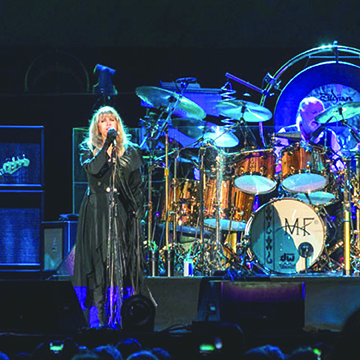
Romantic Tune-up: Celebrate with your sweetie during the Stevie Nicks Concert Screening at Wings Over The Rockies, Feb. 5. Film features her sold-out 24 Karat Gold Tour.
tures a set-list of fan favorites and rare gems.
Considered one of the most important female voices in rock music, Nicks has had six Top Ten albums, eight Grammy nominations and is the first woman to be twice inducted into the Rock & Roll Hall of Fame — with Fleetwood Mac in 1998 and as a solo artist in 2019.
The film highlights Stevie’s intuitive and intimate storytelling abilities, captivating audiences with personal stories behind some of the most famous songs in music history. Event is a fundraiser for Wings Over The Rockies Air & Space Museum and The Lowry Foundation. Information: 303-360-5360.
Lovey-Dovey Doings
Cooking With Cupid @ Cook Street, 43 W. 9th Ave., 303-308-9300. Join Chefs at Cook Street School of Culinary Arts for luxe celebration with your special someone, Feb. 11, 12 & 13, 6-9:30 p.m., Feb. 14, 10 a.m.-1:30 p.m.
D Bar Denver, 494 E. 19th Ave., 303-861-4710. The D stands for drinks, dining and desserts. Perfect date night spot on Valentine’s Day or any day with your lover and friends to enjoy comfort food and award-winning desserts.
Horse & Carriage Ride, along the 16th St. Mall, 720-470-9383. Enjoy a romantic evening snuggled in an Irish Rose Cinderella carriage drawn by draft horses. Choose from Mini to Grand Rides to see city sights and lights.
Valentines Bazaar, 4970 E. Colfax Ave., 720-535-8284. Love Bazaar with eight local vendors and music. Shop, listen to music during weekend extravaganza at GVM Studios, Feb. 6 & 7, noon-6 p.m.

